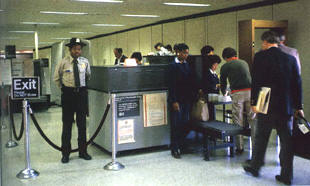Unions Are Good Only For Other People, Notes Loy
 When the TSA' James Loy
(right) announced that "...mandatory collective bargaining is
not compatible with the flexibility required to wage the war
against terrorism" last Thursday, it triggered the expected union
response. Although the government is generally in favor of union
organizing, especially in the private sector, when it comes to
dealing with unions for itself, it sees all kinds of problems.
When the TSA' James Loy
(right) announced that "...mandatory collective bargaining is
not compatible with the flexibility required to wage the war
against terrorism" last Thursday, it triggered the expected union
response. Although the government is generally in favor of union
organizing, especially in the private sector, when it comes to
dealing with unions for itself, it sees all kinds of problems.
Fortunately, since the government doesn't have to follow the
laws it enforces on everyone else, the little demigods that run
various bureaucracies often pick and choose which laws they
want to follow. The TSA, one of the best examples of "independent"
bureaucracy, has long maintained that union organization, and union
work rules, would screw up its ability to deal as it sees fit, with
all eventualities. Congress made the TSA pretty much above the law,
when it was set up; all James Loy, the Under Secretary of
Transportation for Security, has to do, is say that anything he
decides is "in the interest of national security," and he's pretty
much off the hook, as far as the law goes.
No surprises.
 The tens of thousands of folks who
signed up to work for the TSA knew, going in, that the agency
didn't want any unions, and didn't have to have any. Now that
they've "asked nicely," and have been turned down, they're going
the usual route, publicly complaining that the only 'right and
fair' thing for the TSA to do, is to let them organize.
The tens of thousands of folks who
signed up to work for the TSA knew, going in, that the agency
didn't want any unions, and didn't have to have any. Now that
they've "asked nicely," and have been turned down, they're going
the usual route, publicly complaining that the only 'right and
fair' thing for the TSA to do, is to let them organize.
Loy won't do it. He wants to say who will work, for how long,
and for how much money. He doesn't want some union boss
making those decisions for him. These battles are always different
when the government is involved, as bureaucratic and military types
(of which the TSA's entire cadre of overpaid management is
comprised) aren't accustomed to having to follow the laws everyone
else has to follow. Even when, as the unions claim, the law is
clearly controverting the bureaucracies' actions, bureaucrats pay
no heed.
 So comes the predictable
lawsuit: a day after Loy again affirmed he wasn't going to
allow union organizing of his troops, the American Federation of
Government Employees, AFL-CIO, filed suit.
So comes the predictable
lawsuit: a day after Loy again affirmed he wasn't going to
allow union organizing of his troops, the American Federation of
Government Employees, AFL-CIO, filed suit.
The union claims that some employees are being transferred to
airports two hours from home and are forced to work 60 or 70 hours
per week; that isn't what any of the rank and file signed up for,
and, if true, is a good example of why unions are still relevant in
America.
“TSA officials do not have the authority to deprive
workers of their rights to join a labor union,” said AFGE
National President Bobby L. Harnage. “TSA’s broad and
highly questionable personnel authority certainly does not include
taking away first amendment rights.”
 Claiming TSA chief James M. Loy does
not have the authority under the Aviation and Transportation
Security Act to prohibit screeners from organizing, AFGE officially
filed the complaint with the U.S. District Court for the District
of Columbia.
Claiming TSA chief James M. Loy does
not have the authority under the Aviation and Transportation
Security Act to prohibit screeners from organizing, AFGE officially
filed the complaint with the U.S. District Court for the District
of Columbia.
“AFGE is going to vigorously fight on behalf of the 56,000
airport screeners throughout the U.S. to overturn this unlawful
decision by Bush Administration officials,” added
Harnage.
The union says that TSA passenger, baggage and lead screeners
experience unscheduled shift changes, forced overtime, sexual
harassment and delayed paychecks. Baggage handlers are working
without protective equipment when searching for explosives. Only
under union protection will TSA workers have the assurances they
need in order to do the best job possible for the American
people.
[Union dues from the 56,000 workers would top $21 million/year,
according to estimates printed in The Washington Times
--ed.]
 ANN's Daily Aero-Term (04.20.24): Light Gun
ANN's Daily Aero-Term (04.20.24): Light Gun Aero-News: Quote of the Day (04.20.24)
Aero-News: Quote of the Day (04.20.24) ANN's Daily Aero-Linx (04.21.24)
ANN's Daily Aero-Linx (04.21.24) Aero-News: Quote of the Day (04.21.24)
Aero-News: Quote of the Day (04.21.24) ANN's Daily Aero-Term (04.21.24): Aircraft Conflict
ANN's Daily Aero-Term (04.21.24): Aircraft Conflict






